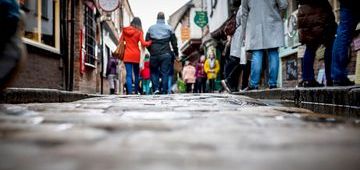This finding is set against a context of declining vaccine coverage rates in the UK in recent years and worrying levels of mistrust in the safety of vaccines globally. Last year’s Global Monitor conducted by the Wellcome Trust highlighted that the latter is a particular issue for higher income countries, with just 73% of people in Northern European countries agreeing that vaccines are safe (75% in the UK). [1]
Among the 81% of respondents who said they would get the vaccine, the main reasons given were as expected – to protect themselves and others – but for the remaining 19% a variety of different explanations were given. These concerns will become clearer over time as the crisis progresses and deeper research is conducted, but the major theme was a lack of trust. Respondents had concerns around the safety, contents and efficacy of a vaccine – either due to the short timeframe and rigorous testing required, or pre-existing nervousness about side effects from vaccines.
More research is needed into this group, but the initial finding makes clear that this is an area requiring attention in the coming months, especially in light of RSPH’s 2019 report, Moving the Needle, in which a fear of side effects was found to be the number one reason for choosing not to vaccinate. [2]
Other explanations given by the 19% who did not say yes included [3]:
- feeling that they have immunity already, as they believe they have had the virus
- a lack of understanding over whether they would be eligible, for example if they don’t ordinarily get offered the flu jab
- wanting other people to have the vaccine before them
- having encountered rumours about the vaccine on social media, for example that it will be contaminated with the virus
More in-depth research into perceptions of a potential Covid-19 vaccine is required to understand the prevalence and strength of any specific concerns amongst the public. It is crucial that, when any vaccine currently in development is eventually made available, public confidence in the stringent development process and final product is as high as possible, to ensure wide-spread uptake among the population.
Shirley Cramer CBE, Chief Executive of the Royal Society for Public Health, said:
“The coronavirus outbreak is teaching us all what it’s like to live in a world without vaccines. It has had an undeniable and extraordinary impact on everyone’s lives, whether felt in terms of loved ones lost before their time, friends and families in grief, or the daily strains of living under lockdown. It is concerning indeed that, despite this upheaval, a substantial minority remain unsure about the prospect of a vaccination against Covid-19.
“Just last year the World Health Organisation listed vaccine hesitancy as one of the top ten threats to global health. Twinned with 2020’s surprise entry to that list, the case for monitoring attitudes to vaccination is surely stronger than ever.
“It is clear that our only long-term exit strategy from the current situation is a vaccine, and so it’s vital that the stage is set for it to be distributed fairly and comprehensively once that time comes. The public should be reassured that vaccines are a safe and exceptionally effective way of fighting infectious diseases like coronavirus, and even in a normal year, save two to three million lives across the globe.”
End notes:
[1] Wellcome Global Monitor 2018, Chapter 5 https://wellcome.ac.uk/reports/wellcome-global-monitor/2018/chapter-5-attitudes-vaccines
[2] Moving the Needle: promoting vaccination uptake across the life course, RSPH, 2019 https://www.rsph.org.uk/our-work/policy/vaccinations/moving-the-needle-promoting-vaccination-uptake-across-the-life-course.html
[3] These results stem from a wide-ranging survey, looking primarily at the impact of self-isolation on mental and physical wellbeing – the findings from which will be published in the coming weeks.



